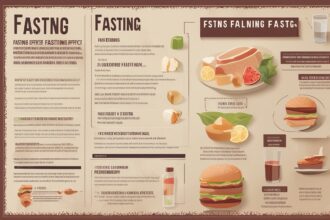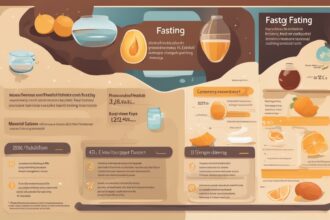Prolonged fasting, often defined as abstaining from food for 24 hours or more, has gained popularity for its potential benefits like weight loss, improved metabolic health, and cellular repair through autophagy. However, while the practice can offer short-term advantages, it also comes with significant concerns, particularly when extended over long periods. This post dives deep into the long-term fasting health risks, shedding light on the side effects that may arise during prolonged fasting and how they can impact your overall well-being.
Understanding Prolonged Fasting and Its Appeal
Prolonged fasting involves extended periods without caloric intake, often lasting from a few days to weeks under medical supervision in extreme cases. Many individuals turn to this practice for reasons ranging from spiritual cleansing to weight management. While short-term fasting can have benefits like improved insulin sensitivity, the risks associated with long-term fasting are often under-discussed. These health risks can affect various bodily systems, making it crucial to approach prolonged fasting with caution and awareness of potential fasting side effects.
Physical Health Risks of Long-Term Fasting
One of the most prominent long-term fasting health risks is the impact on physical health. Extended periods without food can lead to severe nutrient deficiencies, as the body is deprived of essential vitamins, minerals, and macronutrients. Over time, this can result in fatigue, muscle loss, and a weakened immune system. Additionally, prolonged fasting can cause electrolyte imbalances, particularly in sodium, potassium, and magnesium levels, which may lead to symptoms like dizziness, headaches, and even heart irregularities. For more insights on how fasting affects the body, check out our detailed guide on Physical Effects of Prolonged Fasting.
Mental and Emotional Side Effects
Beyond physical concerns, long-term fasting health risks extend to mental and emotional well-being. Prolonged fasting can trigger irritability, mood swings, and heightened stress levels due to the body’s response to low blood sugar and hormonal imbalances. Some individuals report experiencing anxiety or depression during extended fasts, as the brain struggles to function optimally without adequate fuel. If you’re exploring fasting for mental clarity, it’s worth reading our post on Mental Benefits and Risks of Fasting to understand both sides of the coin.
Impact on Metabolic and Hormonal Health
Long-term fasting can significantly disrupt metabolic and hormonal balance, posing serious fasting side effects. While short-term fasting may improve insulin sensitivity, extended fasting can slow metabolism as the body enters a conservation mode to preserve energy. This can make weight loss harder in the long run and may even lead to weight gain once normal eating resumes. Furthermore, prolonged fasting can affect hormones like cortisol and thyroid hormones, potentially leading to adrenal fatigue or hypothyroidism. For a deeper dive into metabolic impacts, see our article on Metabolic Changes During Prolonged Fasting.
Risks of Refeeding Syndrome After Prolonged Fasting.
One of the lesser-known but critical long-term fasting health risks is refeeding syndrome, a potentially life-threatening condition that can occur when food intake resumes after an extended fast. During prolonged fasting, the body shifts to using stored fats and proteins for energy, leading to depleted electrolyte levels. Rapid reintroduction of food can cause dangerous shifts in fluids and electrolytes, resulting in symptoms like heart failure, seizures, or coma. This underscores the importance of gradual refeeding under medical supervision after a long fast. Learn more about safe fasting practices in our guide to Safe Fasting Tips.
Who Should Avoid Long-Term Fasting?
Not everyone is a suitable candidate for prolonged fasting due to the associated health risks. Individuals with pre-existing medical conditions such as diabetes, heart disease, or eating disorders are at higher risk of severe fasting side effects. Pregnant or breastfeeding women, children, and the elderly should also avoid long-term fasting, as their bodies require consistent nourishment. If you’re considering an extended fast, consult a healthcare provider to assess whether it’s safe for you. For additional guidance, explore our post on Who Should Avoid Prolonged Fasting.
Disclaimer: The information provided in this article is for educational purposes only and should not be considered medical advice. Prolonged fasting carries significant health risks and should only be undertaken under the supervision of a qualified healthcare professional. Always consult with a doctor or nutritionist before starting any fasting regimen, especially if you have underlying health conditions or are on medication. We are not responsible for any adverse effects resulting from following the information presented here.
References
- Johnstone, A. (2015). Fasting for weight loss: An effective strategy or latest dieting trend? International Journal of Obesity.
- Mayo Clinic. (n.d.). Fasting diet: Can it improve my heart health?
- Harvard Health Publishing. (2018). Intermittent fasting: Surprising update.
- Trepanowski, J. F., & Bloomer, R. J. (2010). The impact of religious fasting on human health. Nutrition Journal.
- WebMD. (n.d.). What You Need to Know About Fasting.
This content is for informational purposes only and not a substitute for professional advice.






